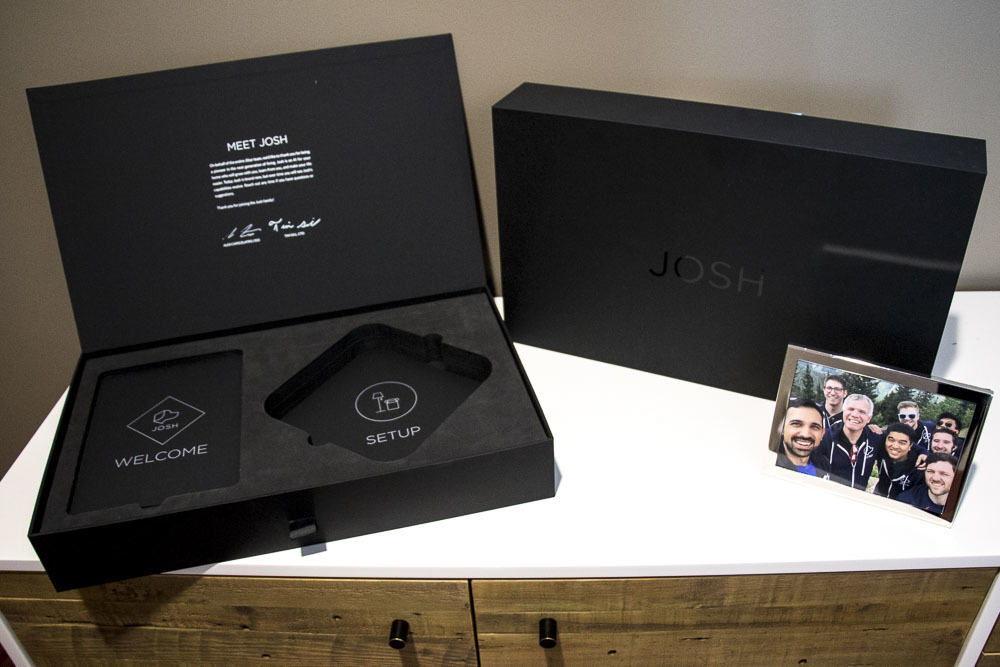Startup of the Week: JStar
Nate, Aaron and Alex working at JStar’s Cherry Creek office. (Chloe Aiello/Denverite)
In this series, we visit Denver-metro, Boulder and Rocky Mountain region startups. Contact [email protected] to be considered.
Smart homes are already here. Wireless connected devices can operate everything from window shades to climate control, from lighting to music. But unified systems are often expensive, complicated and operational only via a control center or tablet.
JStar, with offices in Cherry Creek and Los Angeles, attempts to address that issue. The product founders Alex Capecelatro and Tim Gill are offering: an artificial intelligence platform named Josh.
Josh straddles the boundaries between voice control, smart homes and artificial intelligence. It helps clients streamline their wireless connected home devices on a unified — and intelligent — platform, powered by voice.
But according to Capecelatro, “The best UI, user interface, is no UI.”
 Josh.ai’s packaging, plus the JStar team. (Chloe Aiello/Denverite)
Josh.ai’s packaging, plus the JStar team. (Chloe Aiello/Denverite)
For those who don’t understand technology or have physical limitations, a voice control function can eliminate the need for interaction with a device.
By now, you may be thinking that Josh sounds similar to another popular home automation system, the Alexa-powered Amazon Echo. The one major difference? Artificial intelligence.
 Tim Gill working at the Cherry Creek office. (Chloe Aiello/Denverite)
Tim Gill working at the Cherry Creek office. (Chloe Aiello/Denverite)
Gill is a tech veteran and the entrepreneur behind software publishing company Quark Software Inc.
After selling Quark, Gill took to coding for fun. He has spent the past four years building what would become Josh.ai’s programming language.
JStar’s short-term goal is to ship out about 100 systems that work. The long-term goal is a bit more lofty.
“We want to build a smart AI that can grow with you, learn from you, interact with you,” Capecelatro said. “Technology in general is becoming more intuitive, more human-like.”
Capecelatro compared Josh to the film, “Her,” minus the falling in love part.
Speaking of sci-fi, Gill is a big fan. He said he likes the 1972 novel, “When Harlie Was One,” and “2001 Space Odyssey.” Want Josh to open the garage? Ask it to open the pod bay doors.
For now, Josh is a high-end product. Pricing varies because homeowners work with an integrator who installs Josh for them. They can have hundreds of devices connected on the one platform.
Josh has been installed in about two dozen homes — mostly large homes and second homes — in markets like the Hamptons and Aspen.
“If you think about the first customers who bought the Tesla, they tend to be the same people who are buying Josh systems,” Capecelatro explained.
And similarly to Elon Musk’s vision, JStar wants to start low-volume, with complicated projects at a higher price point. Eventually, they envision a higher volume of simpler installations, at a reduced cost.
JStar would like to see Josh in every home, living on your smartphone, in your earpiece, really anywhere there is a speaker. They would like to see Josh help users with any day-to-day, nonphysical task.
JStar has been beta testing Josh.ai for about a year. They began shipping pre-orders this week.
Co-founders: Alex Capecelatro, Tim Gill
Employees: 12
Industry: Artificial intelligence, internet of things
Incorporated: March 2015
Funding: Private, undisclosed
Offices: Denver, Los Angeles
Multimedia business & healthcare reporter Chloe Aiello can be reached via email at [email protected] or twitter.com/chlobo_ilo.
Subscribe to Denverite’s newsletter here.